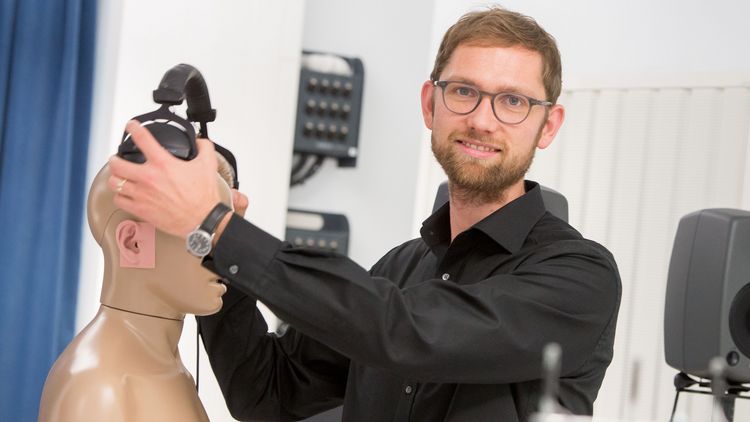Helping people with impaired hearing to enjoy music more is the long-term goal of Oldenburg hearing researcher Dr. Kai Siedenburg. His outstanding research in this area has now earned him a "Freigeist" fellowship from the Volkswagen Foundation.
Siedenburg, an early career researcher at the University of Oldenburg's Department of Medical Physics and Acoustics, will receive 1.1 million euros in funding over the next five years to advance his scientific work and establish his own junior research group. He is one of nine young scientists to be awarded a Freigeist fellowship this year.
Since 2016 Siedenburg has been conducting research in the "Signal Processing" working group at the University of Oldenburg. The group also participates in the Cluster of Excellence Hearing4all. Seindenburg's goal is to find out how hearing-impaired people perceive music and why hearing aids are still inadequate when it comes to conveying music - be it from the Beatles or Beethoven. In his previous research Siedenburg developed mathematical algorithms that break down instrumental sounds into different components. He performs experiments in which he uses these algorithms to determine how listeners identify individual melodies, instruments or singing voices. He is interested in ascertaining how previous musical experience influences listening, which spatial acoustic parameters are optimal for people with hearing loss, and how to adjust hearing aids for listening to music.
In the future Siedenburg plans to investigate the question of how people with impaired hearing perceive music from other perspectives too. He wants to be able to pinpoint which particular instrument in a musical mix a person is listening to at a given moment. For this "musical mind-reading" his team will record the electrical brain activity of subjects using electroencephalography (EEG) and analyse the patterns in order to draw conclusions about music-listening patterns. Siedenburg also plans to subject polyphonic music – i.e. music with several voices – from various genres to acoustic analysis. The overall goal is to establish how to combine different voices to provide listeners with a high-fidelity experience. Siedenburg plans to use the results to develop strategies to improve the mixing of music recordings for people with hearing loss.
"Music is an elementary component of our culture," said Prof. Dr. med. Meinhard Simon, Vice President for Research at the University of Oldenburg. "In his extraordinary research Mr. Siedenburg elegantly combines methods from music psychology, psychoacoustics, signal processing and neuroscience. This will help to provide a much better music-listening experience for people with hearing impairment. Thanks to the fellowship he can now put his ideas into practice and deepen this approach. "
Siedenburg studied mathematics and music at the Humboldt University of Berlin and the University of California, Berkeley (USA). In his diploma thesis in mathematics he specialised in the topic of signal processing. He went on to earn a doctorate in music technology at the McGill University in Montreal (Canada) with research on the perception of musical timbres.
With its Freigeist (Free Spirit) fellowships, the Volkswagen Foundation supports exceptional young researchers from all disciplines who not only have outstanding expertise in their field, but also think boldly beyond the boundaries of their own discipline. The Foundation's mission is to enable these researchers to work on their extraordinary projects and to support their scientific careers. The Foundation has selected ten to fifteen Freigeist fellows every year since 2014.

